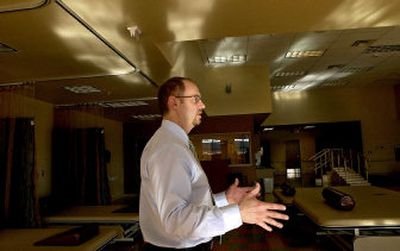Hospital fills gap in long-term care

The first patient admitted to the newest hospital in Post Falls is still too sick to appreciate her surroundings.
She won’t yet notice the earth-toned furnishings, the rehabilitation gymnasium, the 4-foot therapy pool or the state-of-the-art intensive care equipment at the Northern Idaho Advanced Care Hospital, which opened this month at 600 N. Cecil Road.
The woman arrived Tuesday at the $15 million center designed to fill what organizers said is a gap in regional medical care.
Federal privacy rules won’t let hospital officials release any information about the woman or her condition, spokesman Chad Hutson said.
But like all the patients who will fill the 40-bed, 36,000-square-foot hospital, she’s facing serious illness or injury and the prospect of a protracted recovery.
“We’ll see trauma, stroke, surgeries where the patient has had a problem, brain injuries,” Hutson explained.
“The patients we’re getting are going to be here for a long time.”
Before now, there was no local resource for patients who had finished their stays in traditional hospital intensive care units but remained too ill for traditional rehabilitation centers or nursing homes. The average stay for Medicare patients at the hospital will be at least 25 days, said Dr. Kevin Chang, its medical director.
“There are very few of these facilities in the country,” said Chang, who is also part of a group of “intensivist” physicians at Kootenai Medical Center in Coeur d’Alene. “The next closest facility would be in Salt Lake City or Denver.”
Patients such as Mike Kralicek, a Coeur d’Alene police officer who was shot and badly injured on duty, have had to go out of state to complete their arduous recoveries. Now, someone like Kralicek could stay here, Hutson noted.
The hospital received its temporary license last week, said Tom Shanahan, spokesman for the Idaho Department of Health and Welfare. After a few patients have been admitted and treated, state inspectors will assess the hospital’s ability to meet federal Medicare standards.
Approval to provide short-term Medicare-eligible services will be granted first, Hutson said. After six months, when hospital administrators have demonstrated a consistent need for protracted care, the hospital will be designated as a long-term care facility.
Members of the medical community from North Idaho and Eastern Washington have expressed support for the new hospital. It was built in Post Falls because it is between the region’s two largest medical centers, Hutson said.
The new center will relieve pressure on Idaho hospitals from Coeur d’Alene to Boise, said Dr. James Osmanski, director of the intensive care unit at KMC. Currently, hospitals designed for short-term care keep very sick patients for long periods, often at a financial loss.
“It will take those patients that linger in the hospital,” Osmanski said.
State-of-the-art beds and monitoring systems are designed to provide comfort and surveillance for very ill people, including those who must remain on ventilators for long periods. At the same time, the hospital includes rehabilitation resources such as mock bedrooms, kitchens and outdoor obstacles to help people relearn life skills as they get better, Huston said.
It also includes amenities to make families and friends of patients as comfortable as possible. Inviting furniture, a cheery recreation room and a cafeteria that serves gourmet meals – prepared by former Disneyland chef Walt MacDuff – are among efforts to ease what is often a traumatic and prolonged ordeal.
“When they come to us, the family is really having to deal with the reality of the tragedy,” Hutson said. “It’s the realization that your loved one is going to need a lot of long-term care.”